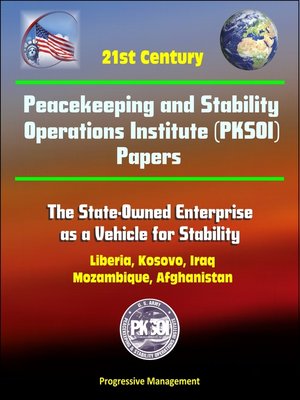21st Century Peacekeeping and Stability Operations Institute (PKSOI) Papers--The State-Owned Enterprise as a Vehicle for Stability--Liberia, Kosovo, Iraq, Mozambique, Afghanistan
ebook
By Progressive Management

Sign up to save your library
With an OverDrive account, you can save your favorite libraries for at-a-glance information about availability. Find out more about OverDrive accounts.
Find this title in Libby, the library reading app by OverDrive.



Search for a digital library with this title
Title found at these libraries:
| Loading... |
This report has made a case that state-owned enterprises (SOEs) affect stability in conflict-prone environments, and decisive control of them creates positive or negative conditions. It describes the importance of SOEs and their treatment in five post-conflict environments. Dr. Efird acknowledges that in areas of the world in which security forces stepped in and took control, their actions helped stabilize the government. In contrast, when security forces failed to act decisively, the fragile government remained or was further destabilized.Topics covered include: Liberia, Kosovo, Iraq, Mozambique, Afghanistan.But as often happens in complex environments, it is a challenge to know how and when to use SOEs, and Dr. Efird rightly points out that a good set of metrics is necessary to measure their effectiveness. He provides an overview of the analytical tool known as "Measuring Progress in Conflict Environments" (MPICE) that is used to determine progress in stability operations. He proposes that associated with this tool are objectives that directly relate to production, or the output of economic resources. Other objectives relate to policy frameworks that directly affect production. Thus using MPICE to measure progress is essential to successful stability operations.Dr. Efird's experiences as a Foreign Service Officer and U.S. Army officer in conflict-prone societies as well as his service as an economic development advisor to the Peacekeeping and Stability Operations Institute (PKSOI) have enabled him to apply economic theory in a practical way in areas of instability. Those of us working in the stability operations arena are fortunate enough to be the beneficiaries.As providers of essential public or commercial services, state-owned enterprises (SOEs) are important in modern economies. Since SOEs are ubiquitous in the global economy, they are likely to be present in conflict-prone societies. In such environments, the defining political and economic systems within which the SOEs exist are likely to embody the interests both of participants in the conflict and of those hoping for an end to the conflict. In stability operations, the imperative for SOEs is to become productive in a way that helps create stability.Achieving this result is apt to be difficult. SOEs are often tainted with the very elements that created the original conflict. They can be microcosms of the societal and economic problems that led to conflict, and the struggle for control over them among actual or former combatants can serve to sustain the original conflict. To avoid that outcome, campaign and development plans must address SOE issues decisively, comprehensively, and pragmatically.Although revitalizing SOEs can be complex and ambiguous, the task can be a useful, intermediate objective on the road to the end state of a sustainable economy. One multinational force commander with experience in Kosovo and Afghanistan described those particular conflict environments as "mosaic wars" offering many perspectives, which therefore made them difficult to visualize.1 In similar contexts, SOEs offer focal points for visualizing the intended end state of the operational environment, precisely because they often are a microcosm of a country's pre-conflict power structure. Consequently, if handled correctly, SOEs can be stepping stones toward stability.Recent experience in stability operations demonstrates the value of gaining early control of and effectively restructuring SOEs. In one Liberian example, United Nations (UN) security forces took steps to enable the state-owned electric power company and state-managed rubber plantations to serve as the basis for political stability. This action yielded three immediate...






